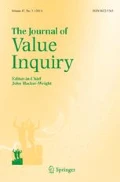Notes
See Jurgen Habermas, Between Facts and Norms (Cambridge, Mass.: MIT Press, 1996); see also John Rawls, Political Liberalism (New York: Columbia University Press, 1993).
Joseph Schumpeter, Capitalism, Socialism and Democracy (New York: Harper Row, 1942), p. 262.
Fernando Teson and Guido Pincione, Rational Choice and Democratic Deliberation: A Theory of Discourse Failure (Cambridge, England: Cambridge University Press, 2006), p. 18.
Ibid. 4.
Ibid. 16–17.
See Claus Offe, “How can we Trust our Fellow Citizens?” in Mark Warren, ed., Democracy and Trust (Cambridge, England: Cambridge University Press, 1999), p. 42–88; see also Gini Graham Scott, The Truth about Lying (Lincoln, Nebr.: Asja Press, 2006).
Emily Pronin, Carolyn Puccio and Lee Ross, “Understanding Misunderstanding: Social Psychological Perspective” in Thomas Gilovich, T., Griffin, D. and D. Kahnemen, eds., Heuristics and Biases: The Psychology of Intuitive Judgment (Cambridge, England: Cambridge University Press, 2002), p. 640.
Ibid. 648.
Amy Gutmann and Denis Thompson, Democracy and Disagreement (Cambridge, Mass.: Harvard University Press, 1996), p. 52.
Rawls, op. cit., xlii.
James Bohman, “Citizenship and Norms of Publicity,” Political Theory, vol. 27, no. 2, (1999), p. 176.
Henry Richardson, “Democratic Intentions,” in William Rehg and James Bohman, eds., Deliberative Democracy (Cambridge, Mass.: MIT Press, 1999), p. 365.
Gutmann and Thompson, op. cit., p. 28.
William Galston, Liberal Pluralism: The Implications of Value Pluralism for Political Theory and Practice (Cambridge, England: Cambridge University Press, 2002), p. 126.
Peter Levine, “Teaching and Learning Civility,” New Directions for Higher Education, no. 152 (2010), p. 16.
See Chantal Mouffe, On the Political (New York: Routledge, 2005).
See Richard Paul (1990) Critical Thinking: What Every Person Needs to Know to Survive in a Rapidly Changing World (Sonoma, Calif.: Sonoma State University Press, 1990); see also Harvey Siegel’s, Educating Reason (London: Routledge, 1988).
See Robert Ennis, “A Taxonomy of Critical Thinking Dispositions and Abilities in Teaching Thinking Skills,” in J. Boykoff Baron and R.J. Sternberg, eds., Teaching Thinking Skills: Theory and Practice (New York: Freeman, 1989), pp. 9–26.
See Michael Lynch, “Against Reflexivity as an Academic Virtue and Source of Privileged Knowledge Theory, ” Culture and Society, vol. 17, no. 26, (2000), pp. 26–54.
George Kateb, “Democratic Individuals and the Claims of Politics” Political Theory, vol. 12 (1984), p. 343.
See Teson and Pincione, op. cit.
Francis Bacon, History of Life and Death. V (Whitefish, Mont.: Kessinger Publishing, 2003), p. 203.
Ernst Bloch, The Principle of Hope (Cambridge, Mass.: MIT Press, 1995).
Paulo Freire, Pedagogy of Hope (New York: Continuum, 2004), p.
Paulo Freire, Pedagogy of the Oppressed (London: Penguin, 1998), p. 66.
See John Rawls, A Theory of Justice (Cambridge, Mass.: Harvard University Press 1971), p. 344; see also William David Ross, The Right and the Good (Oxford: Oxford University Press, 1930).
David Hume, A Treatise of Human Nature, ed., P. H. Nidditch, (Oxford: Oxford University Press, 1975), p. 270.
Baruch Spinoza, The Ethics, trans. R.H.M. Elwes (New York: Dover, 1955), p. 178.
See Friedrich Nietzsche, “Maxims and Arrows,” The Portable Nietzsche, trans. Walter Kufmann (New York: Penguin, 1976), p. 471.
Thomas Spraagens, Civic Liberalism: Reflections On Our Democratic Ideals (Boston: Rowman and Littlefield, 1999), p. 224.
I would like to thank Derek Bell and Peter Jones for discussing the topic of this article on numerous occasions and for making very helpful comments on previous drafts. I am also grateful to Ian O’ Flynn, Graham Long, Albert Weale as well as two anonymous reviewers and Thomas Magnell, Editor-in-Chief of the Journal of Value Inquiry for their help and insightful comments.
Author information
Authors and Affiliations
Corresponding author
Rights and permissions
About this article
Cite this article
Griffin, M.A. Motivating Reflective Citizens: Deliberative Democracy and the Internal Deliberative Virtues. J Value Inquiry 45, 175–186 (2011). https://doi.org/10.1007/s10790-011-9276-y
Published:
Issue Date:
DOI: https://doi.org/10.1007/s10790-011-9276-y

